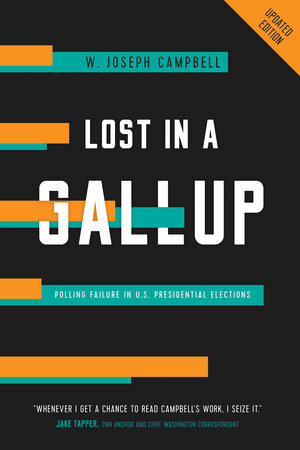 ⇨ W. Joseph Campbell is the author of seven solo-written books, the most recent of which — Lost in a Gallup: Polling Failure in U.S. Presidential Elections — was brought out in 2020 by University of California Press. An expanded soft-cover edition of Lost in a Gallup was published in early 2024.
⇨ W. Joseph Campbell is the author of seven solo-written books, the most recent of which — Lost in a Gallup: Polling Failure in U.S. Presidential Elections — was brought out in 2020 by University of California Press. An expanded soft-cover edition of Lost in a Gallup was published in early 2024.
Lost in a Gallup is a lively, sweeping, and unprecedented assessment of major polling failures in U.S. presidential elections since 1936. The book also delves into the often-exasperating interplay between pollsters and journalists, a complex relationship that has produced years of collaboration as well as bitter disputes and disdain.
The book points out that polling failure often is journalistic failure, given that pre-election polls frame media narratives and set expectations about high-profile political campaigns. They are central to how journalists, and Americans at large, understand a campaign’s ebb and flow.
The book presents original research drawn from the papers of prominent pollsters of the past, including George Gallup, Elmo Roper, Archibald Crossley, Warren Mitofsky, and Louis Harris.
Publishers Weekly described Lost in a Gallup as “entertaining and informative.”
Campbell’s book is well-written, impressively researched
Another reviewer said the book was “a tour de force on the history of presidential polling” and yet another wrote:
“Campbell’s book is well-written, impressively researched, and detailed.”
Here’s an excerpt from Lost in a Gallup.
And here’s a C-SPAN video of Campbell discussing polling failure in presidential elections.
Descriptions about Campbell’s other books follow.
Getting It Wrong: Debunking the Greatest Myths in American Journalism
![cover_myths[1]](https://wjosephcampbell.com/wp-content/uploads/2020/05/cover_myths1.jpg?w=211&h=317) Getting It Wrong debunks prominent media-driven myths, those well-known stories about and/or by the news media that are widely believed and often retold. They include several of the most cherished stories American journalism tells about itself — such as the notion that the Washington Post‘s investigative reporting brought down Ricard Nixon’s presidency in the Watergate scandal.
Getting It Wrong debunks prominent media-driven myths, those well-known stories about and/or by the news media that are widely believed and often retold. They include several of the most cherished stories American journalism tells about itself — such as the notion that the Washington Post‘s investigative reporting brought down Ricard Nixon’s presidency in the Watergate scandal.
The first edition of Getting It Wrong was published in 2010 (see cover at right); an expanded second edition came out in 2017.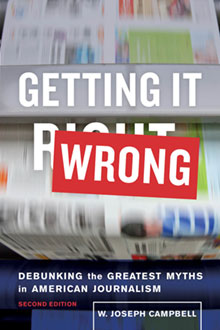
New chapters in the second edition discuss the first Kennedy-Nixon debate in 1960, the “Napalm Girl” photograph of the late Vietnam War, and bogus quotations driven by the Internet and social media.
The first edition of Getting It Wrong won the Society of Professional Journalist’s national Sigma Delta Chi award for Research about Journalism (see image nearby).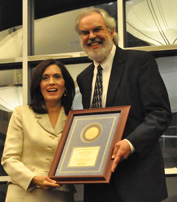
From a review of the first edition, by Jack Shafer, Slate.com:
“Toting big guns and an itchy trigger-finger is American University professor W. Joseph Campbell … flattens established myths that you were brought up to believe were true: that Orson Welles sparked a national panic with his 1938 War of the Worlds broadcast; that the New York Times suppressed news of the Bay of Pigs invasion of Cuba at the request of the White House; that Edward R. Murrow destroyed Sen. Joseph McCarthy; that publishing magnate William Randolph Hearst told an illustrator, ‘You furnish the pictures, I’ll furnish the war,’ before the Spanish-American war started; and more.”
Shafer’s review added:
“The best tonic for the brain fever caused by media myths is an open mind and a free inquiry. I especially admire the disciplined way Campbell corrects so many flawed records without taking cheap shots at the perpetrators.”
From a review by Edward Kosner in the Wall Street Journal:
“Persuasive and entertaining … With old-school academic detachment, Mr. Campbell, a communications professor at American University, shows how the fog of war, the warp of ideology and muffled skepticism can transmute base journalism into golden legend.”
1995: The Year the Future Began
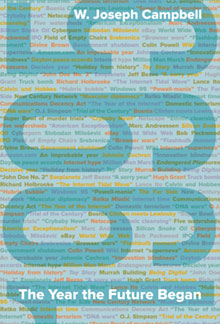 The year 1995 was a critical hinge moment in the recent American past.
The year 1995 was a critical hinge moment in the recent American past.
In 1995: The Year the Future Began (2015) Campbell draws on a variety of interviews, oral histories, memoirs, archival collections, and contemporaneous news reports to present a vivid, detail-rich portrait of a momentous time.
The book offers fresh interpretations about the pivotal moments of 1995: the emergence of the Internet and the World Wide Web into the mainstream of American life; the bombing at Oklahoma City, which was the deadliest attack of domestic terrorism in U.S. history; the sensational “Trial of the Century,” at which O.J. Simpson faced charges of double murder; the U.S.-brokered negotiations at Dayton, Ohio, which ended the Bosnian War, Europe’s most vicious conflict since the time of the Nazis; and the first sexual encounters at the White House between Bill Clinton and Monica Lewinsky, a liaison that culminated in the late 1990s in the spectacle of the president’s impeachment and trial.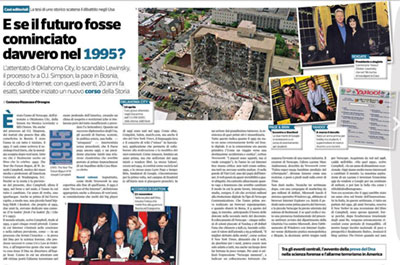
As Campbell demonstrates in 1995, the year was one of surpassing exceptionality, a watershed at the cusp of the millennium. And the effects of the decisive moments of 1995 reverberate still.
Nick Gillespie of Reason magazine called the book “compulsively readable.”
(The image nearby is a portion of a three-page spread that Italy’s largest newspaper, Corriere della Sera, devoted to the book.)
From a review by Robert Fulford in Canada’s National Post:
“Campbell’s intense commitment to his material brings it to life. He’s a persuasive writer with an excellent sense of detail and a knack for narrative. Even those who clearly remember 1995, and know how major events turned out, will find his book illuminating.”
The Year That Defined American Journalism: 1897 and the Clash of Paradigms
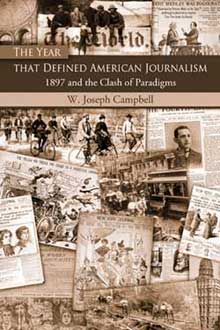
The Year That Defined American Journalism (2006) tells the story of a remarkable and decisive year in American journalism—1897. It is an engaging, deeply researched study about a critical time when journalists were wrestling with the nature, character, and future of the field.
Three disparate options for the future of American journalism emerged during 1897: an activist model championed by William Randolph Hearst and his New York Journal; an impartial, counter-activist approach developed by Adolph Ochs and the New York Times, and a literary paradigm proposed and briefly pursued by Lincoln Steffens at the New York Commercial Advertiser.
From a review in Journalism and Mass Communication Quarterly:
“This book offers a different and well-documented perspective of the Yellow Journalism era… In so doing, [it] makes a significant contribution to our understanding of journalism history and, ultimately, the journalism of today.
From a review in Journalism Studies:
“This is a lively and fascinating book, beautifully written and thoroughly researched. It effectively captures the American fin-de-siècle, providing a snap-shot yet admirably conveying the dynamism and anxieties of the period.”
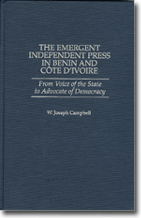 The Emergent Independent Press in Benin and Cote d’Ivoire (1998) |
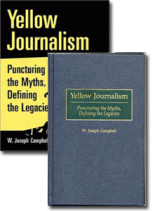 Yellow Journalism: Puncturing the Myths, Defining the Legacies (2001) |
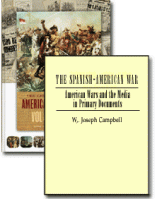 The Spanish-American War: American Wars and the Media in Primary Documents (2005) |
| Read the Introduction Read a review |
Read the Introduction Read a review |